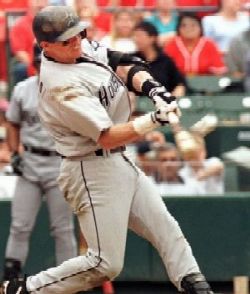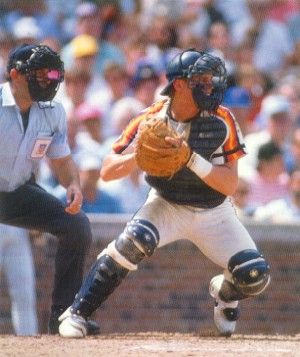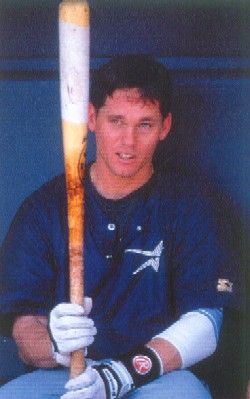
(c) Houston Astros
by Ray Kerby
 (c) Houston Astros |
2004 was a banner year for those who want to make a case for Craig Biggio's enshrinement into Major League Baseball's Hall of Fame. Entering what many expect to be his final season as an Astro, Biggio showed fans that, while most baseball careers only go to 10, he could turn his up to 11 for that extra push.
Always the team player, Biggio moved to left field when the Astros acquired All-Star centerfielder Carlos Beltran. Playing out of position the entire season, Biggio nevertheless posted a personal high with 24 home runs, scored 100 runs and led the team with an impressive 47 doubles and 178 hits. Clearly, the man still had plenty of gas in the tank.
So instead of 2004 being his final year to pad his Hall of Fame case, the Astros picked up Biggio's option for 2005 and allowed Jeff Kent to become a free agent. This ensured another full season as an Astro for Biggio. But things improved even more for Biggio when the HOF selection committee enshrined Ryne Sandberg to the Hall of Fame. The induction of Sandberg, whose career was eclipsed by Biggio several years ago, virtually guarantees that Biggio will get in. And Biggio's chief contemporary rival, Roberto Alomar, announced his retirement after several poor seasons.
This puts Biggio in a great position in 2005 to remove all doubt among voters that he is best second baseman of his generation, a notch above Alomar. For even though Alomar is two years younger than Biggio, he is now retired while Biggio is still chugging along with productive seasons. The case for Biggio's enshrinement has become a no-brainer. Now the question is whether he will get in on the first ballot.
Entering 2005 with 2639 career hits, Biggio has stated that he would like to reach 3000 hits, which would guarantee a first-ballot induction. This would require two more very solid seasons and that seems like a longshot considering Biggio's age. But if anyone can pull it off, he can. Cosnsider that the chances are good that Biggio will finish 2005 with over 2800 career hits, which has not been accomplished by any second baseman in almost 70 years.
I have ranked Biggio's career accomplishments with the 16 second basemen already inducted into the Hall of Fame along with Ryne Sandberg, whose induction still seems likely. However, it does not bode well for Biggio that Sandberg is still waiting. Six significant career categories are listed, all of which are routinely bandied about whenever a player becomes eligible for the Hall: runs scored, hits, home runs, runs batted in, stolen bases, and batting average. I have then assigned points for each category, from 0 to 17, depending on the player's rank.
Comparing Biggio to existing Hall of Famers
(updated to reflect 2007 stats)
Player Era Runs Hits HR RBI SB avg Pts Eddie Collins 10s 1821 3315 47 1300 744 .333 82.5 Rogers Hornsby 20s 1579 2930 301 1584 135 .358 81 Craig Biggio 90s 1844 3060 291 1175 414 .281 78 Nap Lajoie 00s 1504 3242 83 1599 380 .338 76 Charlie Gehringer 30s 1774 2839 184 1427 181 .320 75 Frankie Frisch 20s 1532 2880 105 1244 419 .316 70 Joe Morgan 70s 1650 2517 268 1133 689 .271 65 Rod Carew 70s 1424 3053 92 1015 353 .328 62 Ryne Sandberg 80s 1318 2386 282 1061 344 .285 51 Bid McPhee 1890s 1684 2313 53 1071 568 .277 50 VC Bobby Doerr 40s 1094 2042 223 1247 54 .288 41 VC Tony Lazzeri 30s 986 1840 178 1191 148 .292 42 VC Red Schoendienst 50s 1223 2449 84 773 89 .289 34 VC Jackie Robinson 50s 947 1518 137 734 197 .311 31 Nellie Fox 50s 1279 2663 35 790 76 .288 30 VC Billy Herman 30s 1163 2345 47 839 67 .304 29.5 VC Bill Mazeroski 60s 769 2016 138 853 27 .260 18 VC Johnny Evers 10s 919 1659 12 538 324 .270 12 VC
You can see that there is a clear line of demarcation between second baseman inducted into Hall on their regular ballots, and those entering via the Veterans' Committe (VC). Only Jackie Robinson falls below this line, and he is a special case because he was 28 before he was allowed to play in the big leagues. You can also see that Biggio and Sandberg are in the middle of the pack in this listing.
After a down season in 2002, Biggio's performance has rebounded for two consecutive years. And with the departure of Jeff Kent, Craig resumed his role as the team's second baseman. He was a defensive liability in the outfield, but those concerns should diminish with his return to the infield. Most importantly, his offensive rebound greatly improved his standing against his Hall of Fame competitors. The table below shows Biggio's improving standing against the others over the last three seasons. If Biggio repeats his 2004 season, his career numbers would and projected rankings would be:
Year Runs Hits HR RBI SB avg 2005? 100 178 24 63 7 .281 Career 1703 2817 258 1057 403 .286
Player Runs Hits HR RBI SB avg through 2000 12th 15th 7th 16th 6th 11th through 2001 10th 13th 6th 14th 6th 11th through 2002 9th 13th 5th 12th 5th 12th through 2003 8th 9th 5th 12th 5th 13th through 2004 5th 8th 4th 12th 5th 13th through 2007 1st 3rd 2nd 7th 4th 13th
Biggio has now surpassed Carew on this list of Hall of Famers and is creeping closer to rarified air of Joe Morgan. Although the offensive totals of Biggio's era are not directly comparable to Morgan's, it is reasonable to conclude that Biggio is now on solid Hall of Fame ground. With a solid 2005 campaign, he should get consideration for a first-round induction.
Comparing Biggio to existing candidates
When Biggio is eligible for Hall of Fame consideration, his stiffest competition will come from his contemporaries. This group includes second basemen retiring in the same general time as Biggio, along with good second basemen that had been previously snubbed. Once again, the assumption is made that Ryne Sandberg will be in the Hall of Fame by the time this occurs.
Modern-era second basemen Updated stats through 2007 Player Era Runs Hits HR RBI SB avg obp slg Bobby Grich 70s 1033 1833 224 864 104 .266 .371 .424 Craig Biggio 90s 1844 3060 291 1175 414 .281 .363 .433 Roberto Alomar 90s 1508 2724 210 1134 474 .300 .371 .443 Lou Whitaker 80s 1386 2369 244 1084 143 .276 .363 .426 Jeff Kent 90s 1278 2338 365 1459 94 .290 .357 .504 age 39
 (c) Houston Astros |
There is certainly room in the Hall for two second basemen from the same decade, provided that they are both worthy. But will three get in? If not, the pertinent question is quickly becoming "Will Jeff Kent edge Alomar for the second HOF spot?".
Kent is still going strong and could finish his career with over 350 homers and 1500 RBI. It would be hard to keep any middle infielder out of the Hall with those kinds of numbers. Kent also won the MVP in 2000. This is a major award which neither Biggio nor Alomar has attained.
Biggio's intangibles
 (c) Houston Astros |
Does Biggio have enough good intangibles? I think he does. For one thing, writers love "gamers": those mythical players that go out and play every day despite broken arms, snakebites, and whatever other ailments can bench a merely human player. Biggio had a 494 consecutive-game playing streak, and I think that will help make his case as a "gamer". Coming back successfully from his injury-shortened 2000 season also enhances this part of his reputation.
Biggio also has some impressive-sounding statistical intangibles. In 1997, Biggio became the first player in history to play a 162-game schedule without grounding into a double play. In 1998, he was the first player since Tris Speaker to collect 50 doubles and 50 stolen bases in a single season. It doesn't hurt that Speaker is considered one of the greatest players in the history of the game.
One final intangible that could work in Biggio's favor is his positional switch from catcher to second base to center field. Much can be made about how Biggio was an All-Star catcher and then made the unheard-of transition to second base with such success that he not only become an All-Star at the new position, but he even became a Gold Glove winner. But to willingly move to a new defensive position at age 37 is just as unlikely. This is the kind of "intangible" story that writers love, and we can expect to relive this portion of Biggio's career over and over again when he becomes eligible for the Hall.
Conclusion
 (c) Houston Astros |
2500 hits - accomplished May, 2004
500 doubles - accomplished July 10, 2003
200 homers - accomplished April 18, 2003
1500 runs - accomplished August, 2003
1000 RBI - accomplished April, 2005
At age 39, Biggio has accomplished all of the significant career milestones that I thought four years ago would make him a lock for the Hall of Fame. The best thing is that he is still going strong. Biggio has set his sights on 3000 career hits, which would cement his position as one of the greatest players of all time.
How about some new milestones?
3000 hits - accomplished June 28, 2007
600 doubles - accomplished
250 homers - accomplished
1750 runs - accomplished